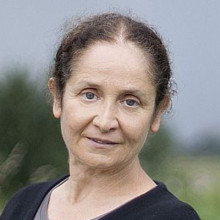Polish literature

Magdalena Tulli
Born in 1955, Tulli is a writer and translator (of Marcel Proust, Italo Calvino and Fleur Jaeggy). She has won prizes awarded by the Kościelski Foundation (1995) and the periodical of international literature, Literatura na Świecie. She has been nominated for the Nike award twice. She lives in Warsaw.
Since 1995, when Dreams and Stones appeared, we have encountered a new phenomenon – “anti-prose”. It is definitely not non-fiction, though it breaks the traditional rules of fiction writing in various ways. As the setting for her first book, Tulli depicted a city that concentrates the features of all cities, with a real and a phantom map, and also roughly resembles Warsaw. Superficially it seems to comply with the rules set by the narrator’s mind, but as the action develops it undergoes an increasing process of disruption from the centre outwards. The real theme here is the transitory nature and collapse of all kinds of established order, and the suffering that is innate in the world by its very nature. Tulli’s second novel, In Red, is set in a “possible world” that she has created to suit her needs. It has the same basic structure as “our” world, but here reality has no permanence. The background and settings are like theatre sets, disappearing from time to time to be replaced by others, but as they act out their dramas, undergo their ordeals, live and die, the characters take no notice of this. In this story suffering is omnipresent, though it is recounted by an unsympathetic, pitiless narrator – a literary device that allows the book to appeal to more universal sympathy. The sad novel Moving Parts, misread by many as a literary puzzle or a commentary on the theory of literature, is essentially a heartbreaking tale about the world’s lack of lucidity, and thus of meaning; it is about the lack of love, justice, and finally truth about our lives. The narrator does his best to tell the trite story of a love triangle, but he keeps being obstructed by other, more tragic tales that disturb the structure of his account by pushing their way into the foreground, as if telling themselves without his involvement. Among them the story of his own fate is told. Tulli blatantly refuses to construct the semblances of reality of the represented world, but in the background to this refusal her story keeps referring to the real histories that lie behind every fabrication. This is not pleasant reading matter – can a book be pleasant if it tells us about the randomness and insignificance of our existence, and concludes that we are stuck in a metaphysical void? This is Magdalena Tulli’s most mature novel, arising under the pressure of the cruel question: why does one write? There is no good answer, just as there is none to the question, why does one live? One lives, and one writes, that’s all.
BIBLIOGRAPHY
- Sny i kamienie, Warszawa: Wydawnictwo Open, 1995.
- W czerwieni, Warszawa: W.A.B., 1998.
- Tryby, Warszawa: W.A.B., 2003.
- Skaza, Warszawa: W.A.B., 2006
- Włoskie szpilki, Warszawa: Nisza, 2011
- Szum, Kraków: Znak, 2014
TRANSLATIONS
Catalan:
- El defecte [Skaza], transl. Marta Cedro, Guillem Calaforra, Barcelona: Raig Verd Editorial, 2015.
- Sabates de taló italià [Włoskie szpilki], transl. Xavier Farré, Barcelona: Raig Verd Editorial, 2018.
Croatian:
- U crvenilu [W czerwieni], transl. Adrian Cvitanović, Zagreb: Hrvatsko Filolosko Drustvo 2008.
Czech:
- Stehy [W czerwieni], transl. Jolanta Kamińska, Praha: One Woman Press, 2002.
- Sny a kameny [Sny i kamienie], transl. Petra Zavřelová, Praha: One Woman Press, 2003.
- Soukolí [Tryby], transl. Iveta Mikešová, Praha, Litomyšl: Paseka, 2006.
English:
- Dreams and Stones [Sny i kamienie], transl. Bill Johnston, New York: Archipelago Books, 2004.
- Moving parts [Tryby], transl. Bill Johnston, New York: Archipelago Books, 2005.
- Flaw [Skaza], transl. Bill Johnston, New York: Archipelago Books, 2007.
- In red [W czerwieni], transl. Bill Johnston, New York: Archipelago Books, 2011.
French:
- Dans le rouge [W czerwieni], transl. Laurence Dyèvre, Paris: Pauvert, 2001.
- Le Défaut [Skaza], transl. Charles Zaremba, Paris: Editions Stock, 2007.
German:
- Traüme und Steine [Sny i kamienie], transl. Bettina Eberspächer, Chemnitz: Oberbaum, 1998.
- In Rot [W czerwieni], transl. Esther Kinsky, München: Deutsche Verlags-Anstalt, 2000.
- Getriebe [Tryby], transl. Esther Kinsky, Frankfurt am Main: Schöffling, 2008.
- Dieses Mal [Skaza], transl. Esther Kinsky, Frankfurt am Main: Schöffling, 2010.
Hungarian:
- Vörösben [W czerwieni], transl. Gábor Körner, Budapest: Magvető, 2004.
Italian:
- Sogni e pietre [Sny i kamienie], transl. Raffaella Belletti, Roma: Voland, 2010.
- Difetto [Skaza], transl. Rafaella Belletti, Roma: Atmosphere Libri, 2012.
Latvian:
- Polonēze sarkanā [W czerwieni], transl. Silvija Brice, Riga: Atena, 2004.
Lithuanian:
- Itališkos „špilkos“ [Włoskie szpilki], transl. Birutė Jonuškaitė, Vilnius: Lietuvos Rašytojų Sąjungos Leidykla, 2014.
- Yda [Skaza], transl. Vytautas Dekšnys, Vilnius: Lietuvos Rašytojų Sąjungos Leidykla, 2013.
Russian:
- Sny i kamni [Sny i kamienie], transl. Irina Adelgejm, Moskva: NLO, 2007.
Slovenian:
- V rdečem [W czerwieni], transl. Jana Unuk, Gorenja vas: Modrijan, 2008.
- Motnja [Skaza], transl. Jana Unuk, Ljubljana: Cankarjeva Zalozba, 2015.
- Italijanski salonarji [Włoskie szpilki], transl. Jana Unuk, Ljubljana: Literarno-umetniško društvo Literatura, 2017.
Spanish:
- El defecto [Skaza], transl. Francisco Javier Villaverde, Barcelona: Rayo Verde, 2015.
- Zapatos de tacón italiano [Włoskie szpilki], transl. Francisco Javier Villaverde, Barcelona: Rayo Verde, 2018.
Swedish:
- Drömmar och stenar [Sny i kamienie], transl. Julian Birbrajer, Stockholm/Stehag: Symposion, 2008.
Ukrainian:
- Sni j kamenì [Sny i kamienie], transl. Wiktor Dmitruk, Lviv: Kalvaria, 2010.